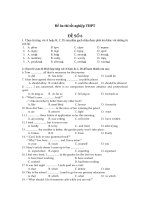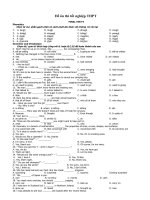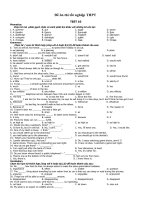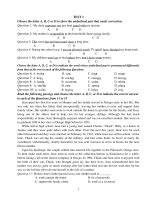- Trang chủ >>
- Đề thi >>
- THPT Quốc Gia
ĐỀ ÔN THI TỐT NGHIỆP THPT MÔN ANH SỐ 17
Bạn đang xem bản rút gọn của tài liệu. Xem và tải ngay bản đầy đủ của tài liệu tại đây (62.15 KB, 3 trang )
ĐỀ ÔN THI TỐT NGHIỆP
THPT MÔN ANH SỐ 17
I. Complete each space with one proper word :
When we have guests to our house, we should (1) __________ very polite to
them, welcome them as warmly (2) __________ possible and try to behave properly
to become a welcome guest if we are (3) __________ to any formal or informal get-
togethers.
It is interesting, and sometimes very important to learn about the standards of
courtesy (4) __________ different cultural areas of the world so that we (5)
__________ practise them well and avoid awkwardness in case we get a chance to
visit a person or a community of unfamiliar social customs.
The Americans, (6) __________ instance, tend to be informal while they’re
receiving company or coming for a social engagement. On the whole, women don’t
usually shake hands as they are introduced to each (7) __________ but men do. When
a man and a woman are introduced, shaking hands is up to the (8) __________. And
punctuality, which means arriving on time, is probably one of the most necessary and
graceful manners in public relations. Most people (9) __________ it discourteous and
inconvenient to arrive at an important appointment later (10) __________ the time
agreed upon.
II. Use the correct verb tense or form:
1. After leaving school he (study) __________ French in Paris for two years and
then (move) __________ to America, where he now (live) _________. He (visit)
__________ England once or twice and (know)__________ English well; but (not
have)__________ yet the opportunity of visiting European countries.
2. He will come at once because I (tell) __________ him by phone that you (need)
__________ him urgently. I’m sure he (find) __________ his way easily although he
(never visit) __________ this house before.
3. This is the second time you (break) __________ a cup; you (break) __________
one yesterday. My last servant (never break) _____________ anything, and you
(break) ___________ nearly half the things in the house.
III. Give the correct prepositions.
1. Better methods of refrigeration depend _______ engineers.
2. Do you have an interest _______ mathematics?
3. It is very kind _______ you to help me.
4. Do you believe _______ God?
5. What is the reason _______ your absence?
6. I’m very proud _______ my father.
7. Are you good _______ repairing cars?
8. I sometimes dream _______ having anew car.
9. Chemistry has provided us _______ synthetics.
10. He has chosen science _______ his career.
IV. Rewrite the following sentences as directed in parentheses :
1. Jane doesn’t speak English as well as Betty.
→ Betty __________________________________________________________
2. He did his homework, then he went to bed.
→ After he _______________________________________________________
3. Your house is bigger than mine.
→ My house ______________________________________________________
4. The lesson is so difficult that we can’t understand it.
→ It is such _______________________________________________________
5. The weather was so cold that we didn’t go out.
→ It _____________________________________________________________
6. The room was so dark that I couldn’t see anything.
→ It _____________________________________________________________
7. The car is so old that he can’t drive it.
→ It _____________________________________________________________
8. The book is so bad that nobody read it.
→ It _____________________________________________________________
9. The homework is so long that I can’t finish it.
→ It _____________________________________________________________
10. The film was so interesting that we couldn’t miss it.
→ It _____________________________________________________________
11. He usually played tennis on Sundays, but now he doesn’t any more.
→ He usually used _________________________________________________
12. The British people drive on the left. They are used to it .
→ The British people are used ________________________________________
13. We have lived in the countryside for many years. We are used to it.
→ We are used ____________________________________________________
14. They lived in a big city many year ago. Now they live in a small village.
→ They used ______________________________________________________
15. She travelled a lot , but now she doesn’t any more.
→ She used _______________________________________________________
16. My boss doesn’t smoke in his office. He isn’t used to it.
→ He isn’t used ___________________________________________________
17. Japanese men don’t shake hands to say good-bye.
→ Japanese men aren’t used __________________________________________
18. American women earn their own money. They are used to it.
→ American women are used _________________________________________
19. Ann enjoyed classical music a lot. But now she likes pop music.
→ Ann used ______________________________________________________
20. My father smoked a lot. But he gave up smoking a week ago.
→ My father used __________________________________________________









